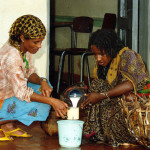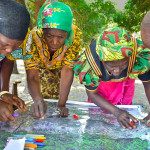The CGIAR Collaborative Platform for Gender Research has a new quarterly newsletter! The newsletter features highlights of gender research across CGIAR, links to selected publications, reports about the webinars organized by the Platform, and upcoming events. In the June 2017 issue, Hazel Malapit from the CGIAR Research Program on Agriculture for Nutrition and Health (A4NH) and >> Read more
New post on the Gender-Nutrition Idea Exchange Blog
In this month’s Gender-Nutrition Idea Exchange blog, Dr. Kathryn Yount, Professor and Asa Griggs Candler Chair of Global Health at Emory University, discusses how to conceptualize and measure the process of women’s empowerment and why this issue is important for development work. Read the full blog on the CGIAR Research Program on Agriculture for Nutrition and >> Read more
JOB OPPORTUNITY: IFPRI Senior Research Assistant/Research Analyst with Agriculture for Nutrition and Health (A4NH)
Summary: Support evaluation & learning, and integration of gender, equity and empowerment research. To apply, please visit www.ifpri.org, click on “Jobs” and then click on “Other Positions” to link you to Position #17-102 –Senior Research Assistant/Research Analyst, A4NH. IFPRI VACANCY ANNOUNCEMENT: >> Read more
BLOGPOST: Reach, benefit, or empower: Clarifying gender strategies of development projects
This month on A4NH’s Gender-Nutrition Idea Exchange, Sophie Theis and Ruth Meinzen-Dick, Research Analyst and Senior Research Fellow in IFPRI’s Environment and Production Technology Division (EPTD), introduce a framework that differentiates the strategies that agricultural development projects use to address gender, and discuss the importance of classifying a project’s approach according to whether it reaches, benefits or empowers >> Read more
BLOGPOST: Keeping doors open through investments in adolescent schooling and nutrition: Lessons from IFPRI’s Impact Evaluations
Adolescence is a crucial stage of life as it shapes an individual’s well-being throughout their life course and affects the well-being of future generations. Using evidence from IFPRIs impact evaluations, Agnes Quisumbing and Crossley Pinkstaff, Senior Research Fellow and Research Analyst in IFPRI’s Poverty, Health and Nutrition Division, present a case for why adolescence is >> Read more
How Women Can Maximize the Nutrition and Health Benefits of Irrigation for All
In a new A4NH Gender-Nutrition Idea Exchange post, Elizabeth Bryan builds on the agriculture-nutrition framework to examine the gendered pathways through which small-scale irrigation can affect nutrition and health outcomes. Read the blogpost here. Also, in case you missed it: In response to increasing interest in how health has bearings on the gender-agriculture-nutrition framework, A4NH organized a seminar >> Read more
A4NH/IFPRI Gender Seminar: Gender, Agriculture, and Health: Tracing the Links
UPDATE: Recording of the screencast and presentations are now available on Slideshare. The CGIAR Research Program on Agriculture for Nutrition and Health (A4NH) and the IFPRI Gender Task Force invite you to: Gender, Agriculture, and Health: Tracing the Links Three 15-minute presentations from: Kelly Jones on livelihood shocks and sexual health Research Fellow, Markets, Trade, >> Read more
Don’t risk your health for nutrition!: Why gender matters for food safety
Some of the foods that would most enhance nutrition in diets in the developing world are also the riskiest in terms of food safety. Numerous health risks exist along the value chain for livestock and fish products, from production to consumption. In this post on the Agriculture for Nutrition and Health (A4NH) Gender-Nutrition Idea Exchange >> Read more
Resources available from the second Gender-Nutrition Methods Workshop
Reposted from the A4NH Gender-Nutrition Idea Exchange blog On December 2-4, 2014, the CGIAR Research Program on Agriculture for Nutrition and Health (A4NH) held the second annual Gender and Nutrition Methods Workshop, hosted by Bioversity International in Rome. Following the successful first A4NH gender-nutrition workshop held in 2013 in Nairobi, this year convened over 40 researchers >> Read more
Using participatory mapping with a gender lens to understand how landscapes are used for nutrition
Many rural people derive their sustenance from sources embedded in their landscape – the cropland, pasture, trees, forests and rivers of their surroundings. The diversity of food in people's diets can be closely linked to how people manage the landscape. Yet there are often significant differences in how men and women interact with the landscape. >> Read more


